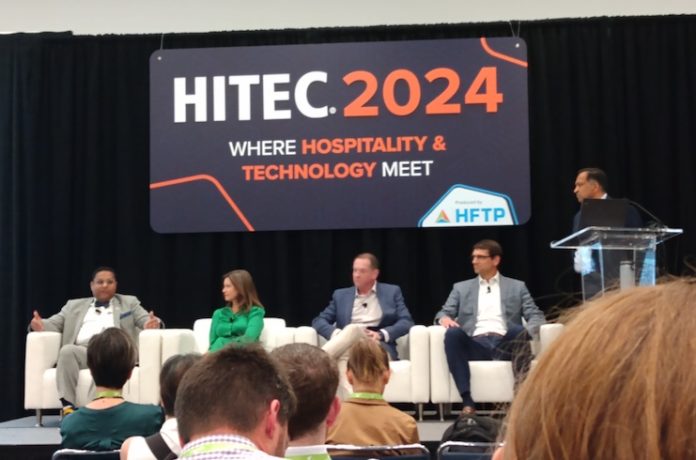
HITEC 2024 is taking place this week in Charlotte, North Carolina, and as can be expected, AI is well represented among the session topics. Several breakouts focused on navigating the many applications of the technology in the hospitality industry. Exploring an especially topical use of AI, “Labor Challenges Weighing You Down? Consider Digital Workers!” convened four panelists: Ajay Aluri, founding director, Nemacolin Hospitality Innovation/Technology Lab & Associates, West Virginia University; Brian Bischoff, principal, CapTech; Aric Briggle, regional vice president hotel finance, Davidson Hospitality Group; and Jennifer Giusti, principal/owner, Just Performance, LLC.
Panel moderator Rajan Gupta, managing partner, Centelli, began the session by citing statistics on the various efforts hoteliers have been making to attract and retain more qualified workers, including increasing wages, expanding benefits, and affording greater job flexibility. And yet, a full 12 percent of the hospitality sector is still experiencing “critical shortages, meaning they actually cannot function effectively,” he noted. “And U.S. Labor Department statistics say there are nine million open jobs with only 6.3 million people available. … So no, technology is not taking away people’s jobs. We just don’t have enough people, in fact, to fill the jobs.” He then suggested that digital workers—software robots designed to perform specific tasks in tandem with human employees—can help to fill that gap.
However, Gupta stressed that while the digital worker is categorized as “artificial intelligence,” it is intended to perform mundane tasks that don’t involve true intelligence. “There is a difference between AI and automation; digital workers are on the automation side. What we’re trying to do is [complete] those repetitive tasks that don’t require brain cells and logic … we’re not making client-based decisions” with the tools, he clarified. “There are things that we can give to automation, which happen in the background so that we can free our time to do things that matter the most.” The result is better customer service as well as an enhanced work-life balance for staff, which in turn improves their morale, Gupta argued.
Panelists made several other points in favor of digital workers:
- Deploying digital workers does not require installing new systems, as the software works with existing systems.
- Digital workers can handle multiple jobs, while humans are often overwhelmed by undertaking too many tasks.
- Digital workers are very scalable; they can be implemented in whatever number required, with no hiring or training process.
- Cybercrimes based on human psychology (e.g., phishing attacks) don’t work on digital workers, nor do these employees make cybersecurity mistakes.
Briggle discussed use cases of digital workers, including expediting the recruitment process by having a digital worker do a first pass on resumes received. He also highlighted a particular digital worker, “Penny,” within Davidson’s finance department “that’s actually reconciling bank accounts; about 150 of those bank accounts every single day is done by a digital worker,” he said. Penny’s human “boss” was also in attendance at the session and noted that the digital assistant has freed up 10 hours of her week, allowing her to “focus more of my time on strategic and analytical tasks including in-depth P&L reviews, forecasting, budgeting, labor use, and cash-flow analysis.” As a result, she has been able to demonstrate to upper management that she can be “more analytical,” which furthers her career. Bischoff later added that these time savings can easily be quantified toward showing the ROI of the automation, which is essential for any new tech tool.
In a concluding point, Gupta emphasized that digital workers are not a solution to the labor crisis. Rather, the tool “helps us move the needle in the business … and that’s really all we’re looking at. Automation is not going to solve every problem [hoteliers] face. The political challenges always be there; the dynamic environment that we live in will always be there; immigration challenges will always be there. It’s just about making sure that we can make one step at a time.”










